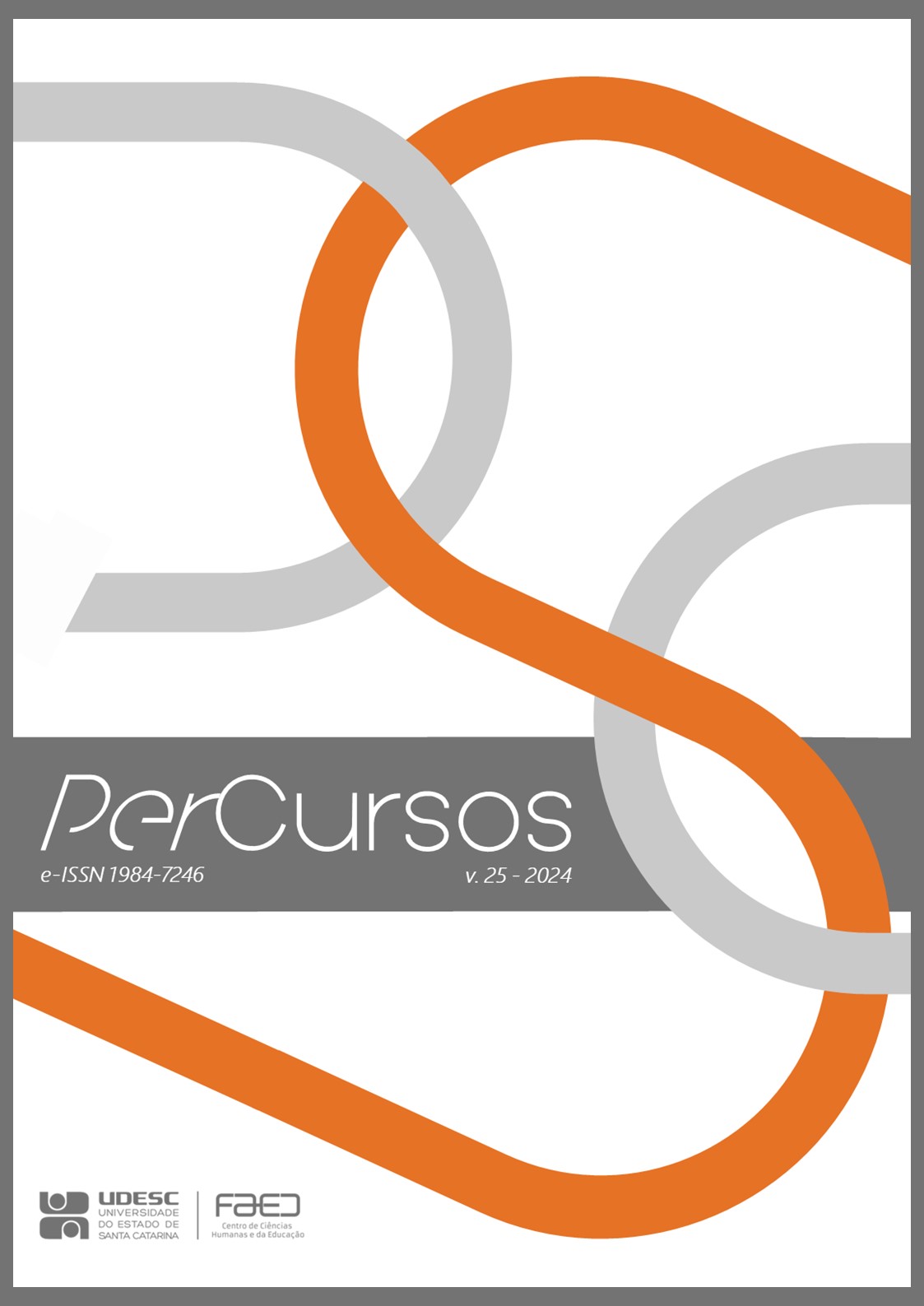"Blackening the ways": the Mapinduzi Collective and the promotion of black intellectuality
DOI:
https://doi.org/10.5965/19847246252024e0112Keywords:
black intellectuals, anti-racist education, UECE pedagogy, Mapinduzi CollectiveAbstract
In the face of the historic struggles of black people in Brazil, affirmative policies and discussions about the urgency of an anti-racist society/education are expanding. This movement encounters systematic barriers arising from whiteness and racism and, in universities, specifically, they negatively impact the training of teachers and education professionals. In response to this logic, university students from the Pedagogy course at the State University of Ceará (UECE) took action in 2021, founding the “Mapinduzi Collective”: a reading group of black intellectuals, a place of affection, dialogue and resistance. Thus, this article's general objective is to reflect on the construction of places to promote black intellectuality based on the experience at the Mapinduzi Collective/UECE. This is a qualitative research, a report of this experience of student "aquilombamento" that is strengthened by the intersectional perspective to discuss teacher education. The main discoveries confirm the absence of studies of black intellectuals during Pedagogy training, which report an institutionally whitened curriculum. Also noteworthy is the autonomy, boldness, power and avant-garde experience written by the Mapinduzi Collective, by creating and opening a permanent space to present, discuss and construct black thought within the University, welcoming students, the majority of whom are black, eager to meet and be black intellectuals.
Downloads
References
ALVES, Odailta. Letras Pretas. In: ALVES, Odailta. Letras pretas. Recife: publicação independente, 2022. p. 1.
AKOTIRENE, Carla. Interseccionalidade. São Paulo: Editora Jandaíra, 2022.
BENTO, Cida. O pacto da branquitude. São Paulo: Companhia das Letras, 2022.
BRASIL. Diretrizes Curriculares Nacionais para a Educação das Relações Étnico-Raciais e para o Ensino de História e Cultura Afro-Brasileira e Africana. Brasília, DF: MEC, 2003.
BRAÚNA, Carla Jeany D. et al. Letramento racial crítico: ações para a construção de uma educação antirracista. Ensino em perspectiva, Fortaleza, v. 3, n. 1, p. 1-10, 2022. Disponível em: https://revistas.uece.br/index.php/ensinoemperspectivas/article/view/8869/8156. Acesso em: 10 jul. 2023.
COLLINS, Patricia Hill. Pensamento feminista negro: conhecimento, consciência e a política do empoderamento. São Paulo: Boitempo, 2019.
FEITOSA, Karla Nadjla Gomes et al. Espaço de afetos, fala e escuta sensível no Coletivo Mapinduzi. In: SEMANA UNIVERSITÁRIA DA UECE, 28., 2023, Fortaleza. Anais [...]. Fortaleza: EdUECE, 2023. Disponível em: https://semanauniversitaria.uece.br/anais/paginas/trabalhos.jsf. Acesso em: 01 jun. 2024.
FREIRE, Paulo. Pedagogia do oprimido. 74. ed. Rio de Janeiro: Paz & Terra, 2020.
FREIRE, Paulo. Educação como prática da liberdade. 54. ed. Rio de Janeiro: Paz & Terra, 2015.
GOMES, Nilma Lino. Educação e identidade negra. Aletria, [s. l.], v. 9, n. 1, p. 38-47, 2002. Disponível em: https://periodicos.ufmg.br/index.php/aletria/article/view/17912. Acesso em: 10 jul. 2023.
GOMES, Nilma Lino. O movimento negro educador: saberes construídos nas lutas por emancipação. Petrópolis: Editora Vozes, 2017.
GONZALEZ, Lélia. Por um feminismo afro-latino-americano: ensaios, intervenções e diálogos. Rio de Janeiro: Zahar, 2020.
HAMPTÉ BÁ, Amadou. Amkoullel, o menino fula. 4. ed. São Paulo: Palas Athena, 2021.
HOOKS, bell. Ensinando a transgredir: a educação como prática da liberdade. São Paulo: Editora WMF Martins Fontes, 2013.
HOOKS, bell. A prática do amor. In: HOOKS, bell. Escrever além da raça: teoria e prática. São Paulo: Elefante Editora, 2022. p. 290-302.
HOOKS, bell. Ensinando comunidade: uma pedagogia da esperança. São Paulo: Elefante, 2021a.
HOOKS, bell. Tudo sobre o amor: novas perspectivas. São Paulo: Elefante Editora, 2021b.
IBGE. Conheça o Brasil: população: cor ou raça. [S. l.]: IBGE, 2022. Disponível em: https://educa.ibge.gov.br/jovens/conheca-o-brasil/populacao/18319-cor-ou-raca.html#:~:text=De%20acordo%20com%20dados%20da,9%2C1%25%20como%20pretos. Acesso em: 10 jul. 2023.
MORAES, Eunice Léa de. Educação libertadora e feminismo negro: uma teia conceitual de resistência à interseccionalidade das opressões de gênero, de raça e de classe. Curitiba: CRV, 2021
NASCIMENTO, Beatriz. Uma história feita por mãos negras. Rio de Janeiro: Zahar, 2021.
PINHO, Carolina B. Pensamento feminista negro como orientação teórico-metodológica de uma pedagogia revolucionária. In: PINHO, Carolina B.; Mesquita, Tayna V. L. (org.). Pensamento feminista negro: primeiras aproximações. São Paulo: Serpente, 2022.
QUINTILIANO, Marta. É preciso aquilombar o território educacional. Revista Desenvolvimento Social, [s. l.], v. 28, n. 2, p. 11-26, 2022. Disponível em: https://www.periodicos.unimontes.br/index.php/rds/article/view/6116. Acesso em: 15 fev. 2024.
RAMOS, Marise Nogueira. Pedagogia das competências: autonomia ou adaptação. 11. ed. São Paulo: Cortez, 2001.
RARA. [S. l.: s. n.], 2013. 1 vídeo (6 min.). Publicado pelo canal Preta RaraPreta. Disponível em: https://youtu.be/5VQFKDJ0Qzg. Acesso em: 10 jul. 2023.
SOBRINHA, Zélia Maria Lemos Andrade et al. Coletivo Mapunduzi e a potencialização de uma formação docente antirracista. In: SEMANA UNIVERSITÁRIA DA UECE, 28., 2023, Fortaleza. Anais [...]. Fortaleza: EdUECE, 2023. Disponível em: https://semanauniversitaria.uece.br/anais/paginas/trabalhos.jsf. Acesso em: 01 jun. 2024.
SOUZA, Neusa Santos. Tornar-se negro. Rio de Janeiro: Zahar, 2021.
RACIONAIS. [S. l.: s. n.], 2014. 1 vídeo (6 min.) Publicado pelo canal Racionais TV. Disponível em: https://youtu.be/mrAT_xG-opk. Acesso em: 10 jul.2023.
Published
How to Cite
Issue
Section
License
Copyright (c) 2024 PerCursos

This work is licensed under a Creative Commons Attribution-NonCommercial 4.0 International License.


